Archived Fire Damage Blog Posts
Tips to Stay Safe during Fire Damage: SERVPRO of Forsyth & Dawson
3/29/2022 (Permalink)
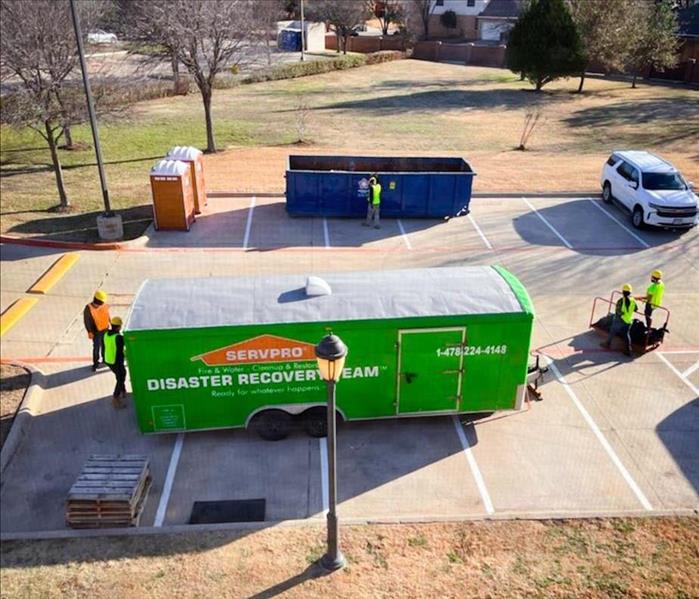 No matter how serious your property damage may be, SERVPRO of Forsyth & Dawson is your local expert for restoring your home or business.
No matter how serious your property damage may be, SERVPRO of Forsyth & Dawson is your local expert for restoring your home or business.
It's that time of year again - fire season in Forsyth County, GA, and surrounding areas. Between February and May, the weather gets hotter and drier, while the risk of house fires rises. A fire may start from a variety of sources, ranging from a faulty wire to an overloaded outlet to a kitchen mishap to a bonfire left unattended. It's critical to know how to react quickly and effectively if your home catches fire.
Here's What You Need To Know If A Fire Starts:
The first line of defense against a house fire is to know how to use the proper fire extinguisher for the situation. This simple procedure can help save lives and hundreds of thousands of dollars in property damage. If the fire spreads uncontrollably, evacuate immediately and stay away, then call 9-1-1. Leave all of your belongings where they are and save yourself and your loved ones.
If your clothing ignites, remember the old adage: Stop, Drop, and Roll.
It's critical to utilize the stairs if you live in a building with elevators in case of a fire. The elevator electrical system may be damaged by a fire, causing the shaft to operate like a chimney and rapidly fill up with deadly fumes.
Doors may be used to your advantage in a fire, potentially saving your life. If the doorknob or handle is hot, don't open it. If you can't exit through the primary route, look for another option. Do not open any doors that are warm to the touch.
Close any doors that might obstruct your exits, lay a wet towel beneath the doors, and call the fire department or 9-1-1 if flames, heat, or fire block your avenues of escape. Tell them exactly where you are so they can find you.
If you're near a window that you can't use as an escape, open it and wave a brightly colored cloth or use your phone flashlight to signal for help.
What To Do After a Fire
After a fire, it is important to contact a professional fire damage restoration company like SERVPRO of Forsyth and Dawson Counties. We have the training, experience, and equipment to properly restore your home - "Like it never even happened."
If you try to clean up the fire damage yourself, you could end up making the situation worse both in your home and with your insurance company's process.
Trust the experts, and call today!
Keep the Ambiance, Ditch the Danger — Alternatives to Traditional Candles
2/21/2022 (Permalink)
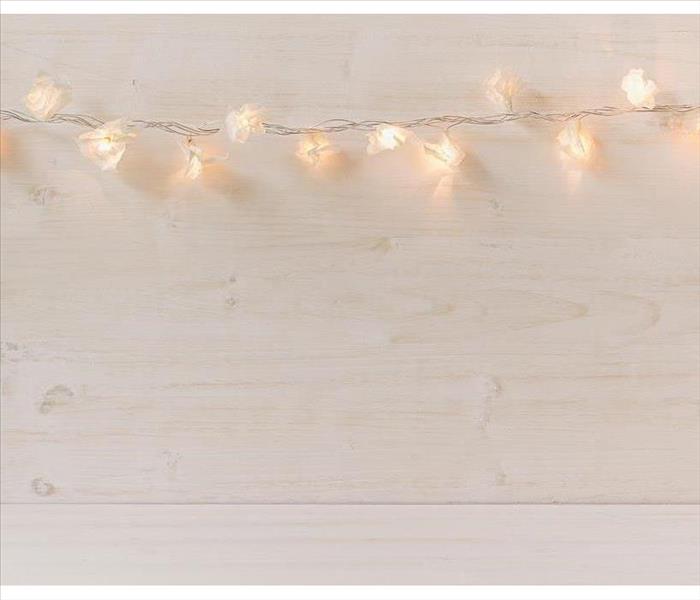 Fairy lights provide the same relaxed lightning that candles offer.
Fairy lights provide the same relaxed lightning that candles offer.
Four Alternatives to Traditional Candles
Whether you live in Hollywood or in Ludville, GA, candles have long been portrayed as the go-to option for setting the mood. But the movie fantasies neglect to mention the dangers of having open flames all over your bathtub, furniture, counters or patio: In a recent five-year period, instances of candle fire were reported 23 times a day and 37 percent of fires began in the bedroom. Add to that the soot and smoke cleanup required for your carpets and you might want to look elsewhere for ambiance. Here are four alternatives you can use every day in your home.
1. Fairy Lights
These twinkling strings of lights that are smaller than traditional holiday tree lights are frequently featured in your favorite social media posts. They are often available with energy-saving LED bulbs, many are battery-operated, and some come with remote control.
2. Flameless Candles
People have been using these electronic candles in offices for years because they provide great aromas without flames. They are a sneaky way to get the appearance of candle fire without worry.
3. Wax Melters
Sometimes referred to as candle warmers, these electric plug-in devices gently warm candle wax without flames. Bonus: They come in a variety of colors and some have side panels that transform a simple pot into a decorative lamp.
4. Oil Diffusers
Available in nearly every home store, these jars can be filled with rotating scents depending on your mood. Simply replace the reed sticks and pour in a new fragrance oil for worry-free air freshening. The best part about these is you can fall asleep without the worry of batteries dying, wax drips, or smoke cleanup.
You don't have to give up the romance of candles because you're trying to avoid a candle fire in your home in Ludville, GA. Simply think beyond the movies and pick a safer alternative.
Commercial Fires Can Leave Lingering Problems for Building Owners
1/21/2022 (Permalink)
 Fire damage in Dahlonega, GA.
Fire damage in Dahlonega, GA.
Building Owners May Face Long-Term Issues As a Result of a Commercial Fire
After a commercial fire in Dahlonega, GA, the building can be expected to need a good smoke cleaning by professionals to remove the stains left behind by the soot and dark fumes of billowing smoke-filled clouds. But weeks or months later, an unexpected smoky or acrid smell may arise. That is when most people ask themselves what happened.
Dark Stains
Discoloration can generally be removed by a team of fire specialists. Using specialized cleaning methods and chemicals, the team can often quickly remove the damaging stains from the walls, floors, and ceilings. Once the stains from the smoke damage have been removed, the building can quickly be reopened for business.
Unpleasant Odors
What many people do not realize is that a general smoke cleaning only removes surface pollutants. During a fire, flames can send out gas fumes as they consume items. The gases may include the following:
- Hydrogen cyanide
- Carbon monoxide
- Phosgene
- Hydrogen Chloride
- Nitrogen Dioxide
As the fumes penetrate the surfaces of most porous items inside the building, they become hidden by the more offensive nature of the smoke and soot. Once the surface smoke and soot are removed, the gases typically become noticeable.
Specialized Cleaning
Fire and smoke restoration specialists can fight the noxious and offensive smells left underneath the smoke odor with air cleaners. These include ozone machines, air filtration devices, and thermal foggers. By initiating a full area air cleaning along with the surface cleaning, your building can typically be returned to normal quickly when the majority of offensive odors have been removed.
Smoke cleaning is important, but it is only part of the cleaning often necessary to fully remove the offensive and lingering gases trapped in the interior of your commercial building. It is often best to look to a restoration team right after the fire to minimize the hold the odors may have on your property.
3 Things To Consider When Buying an Extinguisher
11/10/2021 (Permalink)
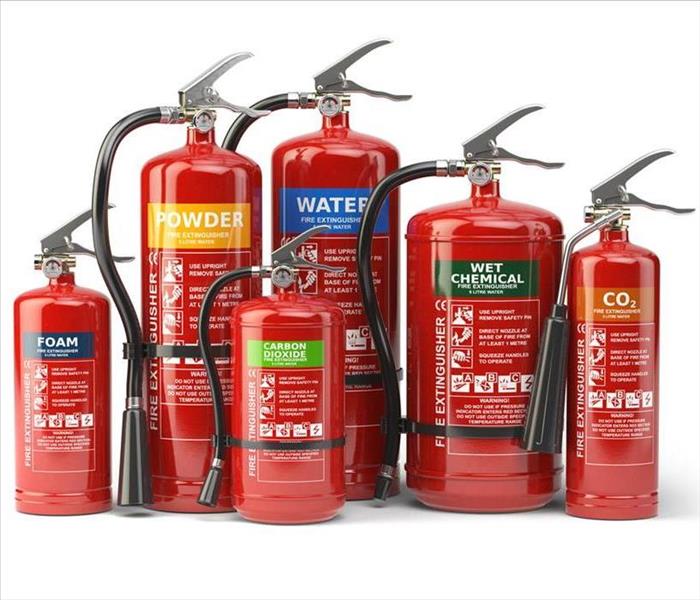 Having at least one fire extinguisher in your home is a great safety practice.
Having at least one fire extinguisher in your home is a great safety practice.
How To Choose the Right Extinguisher
Having a fire extinguisher in your Dahlonega, GA, home can help you stop a house fire from becoming a disaster. To best protect your home, you need to buy the right extinguisher for the space. You can turn to a residential fire damage professional and this guide to help you choose the best product for your needs.
1. Where Will It Be Used?
Are you going to put the extinguisher in your garage, kitchen or laundry room? Believe it or not, the location of your extinguisher should actually dictate what product you buy. In the garage, for example, you may want a larger model because the home fire may grow before you notice it in this space. On the other hand, you may be able to use a smaller model in the kitchen where you'll typically spot fires before they grow out of hand.
2. What Kind of Flames Will It Fight?
Did you know that a fire extinguisher may be designed to fight a certain kind of flame? This safety equipment often comes labeled as A, B, or C. The A category works well against common combustibles, including cloth, wood, and paper. B extinguishers are often designed to tackle fires caused by cooking oils, gasoline, or other liquids. The C products may help with electric fires. As you purchase your tool, you need to think about the kind of fires that may take place in the room you want to keep it in.
3. How Easy Is It To Use?
Will anyone be able to use the extinguisher? A big part of fire preparedness is making sure everyone in your home can tackle an emergency situation. Purchasing an extinguisher that has an easy-to-use hose may make it easier for anyone in your family to dampen flames. It may be a good idea for you to include a how-to demonstration during your next family fire drill.
Having at least one fire extinguisher in your home is a great safety practice. Getting the best product for your space can increase the safety tool's usefulness.
Choosing the Right Smoke Alarm in 3 Steps
7/23/2021 (Permalink)
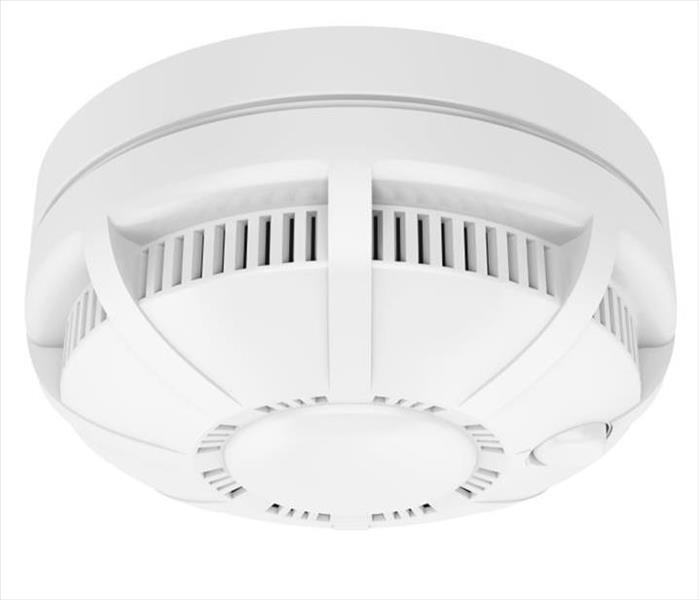 Testing the smoke detector should be done once a month.
Testing the smoke detector should be done once a month.
3 Steps To Choosing The Best Smoke Alarm
Alerting your residence of a fire in Cumming, GA requires the appropriate type of protection. To make sure your home stays safe, here are three steps to choose a smoke alarm that’s perfect for your needs.
1. Understand the 3 Types of Residential Fire Alarms
Ionization alarms use an electric current to quickly pick up fast flame fires such as kitchen fires or burning light furniture. They are, however, prone to nuisance tripping from shower steam or burnt food.
Alarms that use a strobe light for better detection of smoldering fires are photoelectric. They are less prone to going off from minor fires and are better at alerting to dangerous slow burning fires of heavy furniture and building materials.
Combing the two, dual-sensor alarms offer detection of both fast flame and smoldering blazes. While they may false alarm because of the ionization component, they are the most comprehensive coverage.
2. Decide Which Type Fits Based on Your Home Design
The number of detectors necessary for fire safety depends on the size of your home. A centralized system is recommended since noise may not carry throughout the home from a single unit to appropriately alert everyone.
A smoke alarm should be put in every room and outside each door to establish coverage of the entire premise. To prevent nuisance tripping, it’s worth considering using a photoelectric alarm around the kitchen or outside of bathrooms.
3. Evaluate the Unit Before Buying
Reading through any relevant information, you should familiarize yourself with proper maintenance of the unit before buying to make sure it’s reasonable to maintain.
Testing the smoke detector is a monthly procedure, so consideration should be made towards features that simplify the process to ensure it gets done. Additionally, you should learn how to silence the device without disabling it to always have continuous protection.
A smoke alarm can only do so much. A fire damage restoration company reverses damage and repairs burnt parts of your home. Choosing the right alarm types for your home allows you to act sooner to prevent more damage while increasing the likelihood of successful restoration.
3 Ways To Reduce the Likelihood of a Cigarette Fire in Your Home
6/25/2021 (Permalink)
 Smoke outdoors.
Smoke outdoors.
What Will Reduce The Chance Of A Fire From Smoking?
In the US alone, the average cigarette fire is responsible for over 1,000 deaths and 3,000 injuries each year, making up around 20 percent of total fire deaths annually. Therefore, if you’re a smoker in Dahlonega, GA, you may want to consider taking a few precautions while you indulge your habit. These are some of the most effective yet simple changes you could make:
- Going outdoors to smoke
- Keeping ashtrays away from the house
- Considering smokeless alternatives
1. Take It Outside
Cigarette fires typically gain their momentum when hot cinders come into contact with dry, flammable materials such as carpets, upholsteries and other household fabrics. The best way to avoid the fire cleanup efforts these can lead to is to smoke outdoors. It may not be as comfortable as an experience, but it certainly leads to fewer fires overall.
2. Position Ashtrays Properly
Not every cigarette fire starts as a carelessly discarded cinder. In fact, many start in ashtrays. When you flick your ashes into the tray, it’s important to remember that not all of them are dead. If a blaze comes back to life and it’s too near your home or other belongings, an ashtray fire could lead to a serious fire in a matter of minutes. Keep ashtrays away from your home’s siding while outdoors.
3. Try E-Cigs and Vapes
You can also combat the issue by using a number of cigarette alternatives, such as e-cigarettes and vapes. These are designed to give smokers the nicotine fix they crave while cutting out the harmful effects and odors of smoke and the risks that fire offers.
Don't put your home at risk. Taking any or all of these precautions can help to drastically reduce the chances of a cigarette fire occurring on your property, so you can enjoy your habit without worry.
How To Get That Weird Smell Out of Your Microwave
3/30/2021 (Permalink)
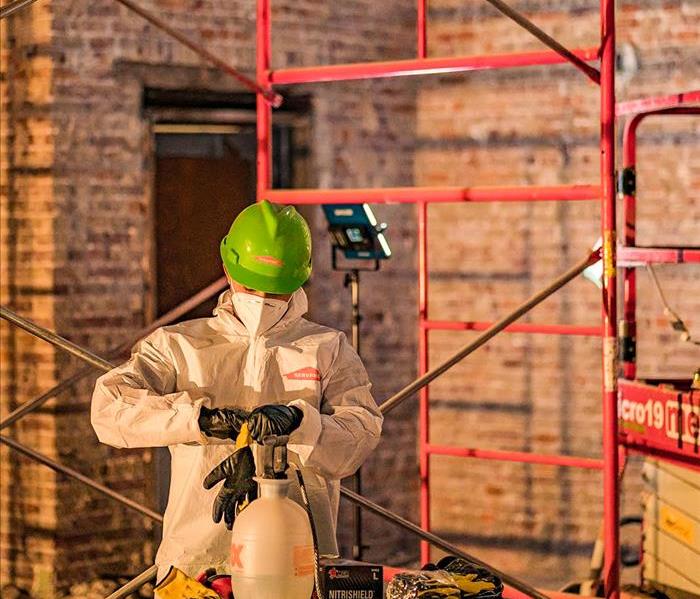 Microwave maintenance is an important element of fire safety.
Microwave maintenance is an important element of fire safety.
Smoke Removal From Your Microwave
You know how it goes: There was that one time you popped popcorn, got a little distracted, left it running a little too long... and now your microwave has that distinct burnt popcorn smell that loves to linger. It's time to give it a good deep clean. If you want to know how to get that smoke smell or any other weird smell out of your microwave, follow these three steps.
1. Interior
Start with the interior using the vinegar method: Essentially, you want to mix 2 tablespoons of vinegar with 2 cups of warm water in a microwave-safe bowl. Heat on high until boiling, and then let it sit for a few minutes so that the steam can loosen up any grime inside. This will make it much easier to then wipe out the entire inside of the unit.
2. Exterior
You can also use a vinegar-and-water mixture to wipe down the door and exterior parts of the unit. Tackle the gaskets and little pieces along with the door as well. Use an old toothbrush to help you get into the nooks and crannies. Try to remove all food splatters that could be retaining that smoke smell.
3. Vent and Filters
Don't forget about the vent grill, where oil and buildup can stay trapped, keeping that smoke smell in with it. With some styles, you can remove the vent in order to better clean it. Use a degreaser to loosen stuck-on oil so that it wipes off easily. Check for filters as well. These can be soaked in hot, soapy water or, depending on manufacturer specifications, run through the dishwasher.
Maintaining your microwave won't just help it smell better; it is an important element of fire safety too. Tackling the weird smells is a whole lot easier than handling fire cleanup in Coal Mountain, GA for which you'd definitely want professional help. It's worth it to put in a little elbow grease now.
Do You Have the Right Home Fire Extinguisher?
2/2/2021 (Permalink)
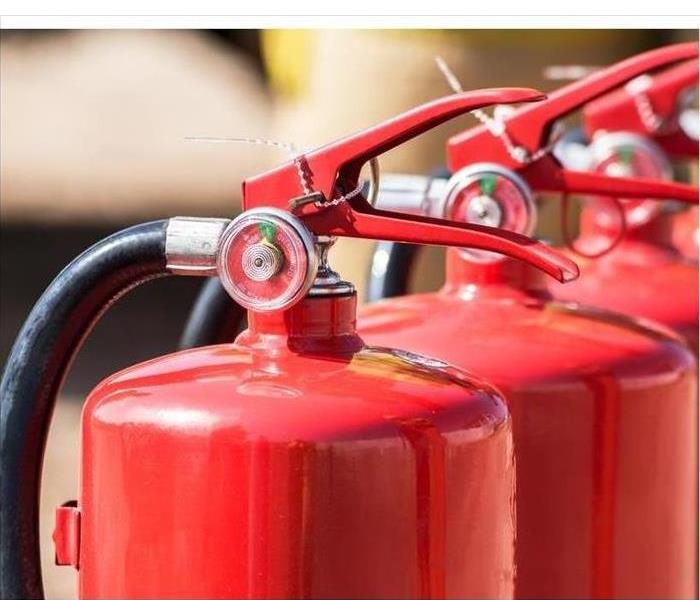 A fire extinguisher must be full and sealed to maintain pressure.
A fire extinguisher must be full and sealed to maintain pressure.
3 Factors That Will Determine the Effectiveness of a Home Fire Extinguisher
Homeowners should take measures to increase their fire preparedness. These three factors will determine the effectiveness of a home fire extinguisher in the event of an emergency.
1. Check the Class
There are several common extinguisher classes distinguished on the basis of fire suppressant compounds. Class A extinguishers contain monoammonium phosphate for ordinary combustibles. Class B and C extinguishers combine monoammonium phosophate with sodium bicarbonate. Class B is intended for flammable liquids or gases other than cooking oils or grease, while Class C is formulated for electrical fires.
Homeowners may want to obtain multi-class fire extinguishers for all of these risks. It is less likely that they will need a Class D extinguisher for combustible metals or even a Class K extinguisher for cooking oils and grease. Extinguishers may actually spread a cooking fire. It is better to douse a kitchen fire in baking soda (sodium bicarbonate) and salt and smother the flames with a metal lid or another pan.
2. Make Sure the Extinguisher Is Filled and Sealed
A fire extinguisher must be full and sealed to maintain pressure. Refillable extinguishers usually have metal valves and cost more up front, though refills cost less than a new disposable model. Disposable extinguishers are more affordable, but are made for one-time use.
3. Check the Expiration Date
An extinguisher may or may not have an expiration date, but this safety equipment does not last forever. An extinguisher should work for anywhere from five to 15 years. Check the pressure gauge to determine whether safety equipment is ready to use.
A fire extinguisher that has insufficient pressure or one that has been used before and has not been replaced or refilled may not function as intended. If a fire damages building materials or contents at a residence in Cumming, GA, mitigation and restoration professionals can clean up damage and complete a rebuild.
7 Ways to Prevent Kitchen Fires
12/8/2020 (Permalink)
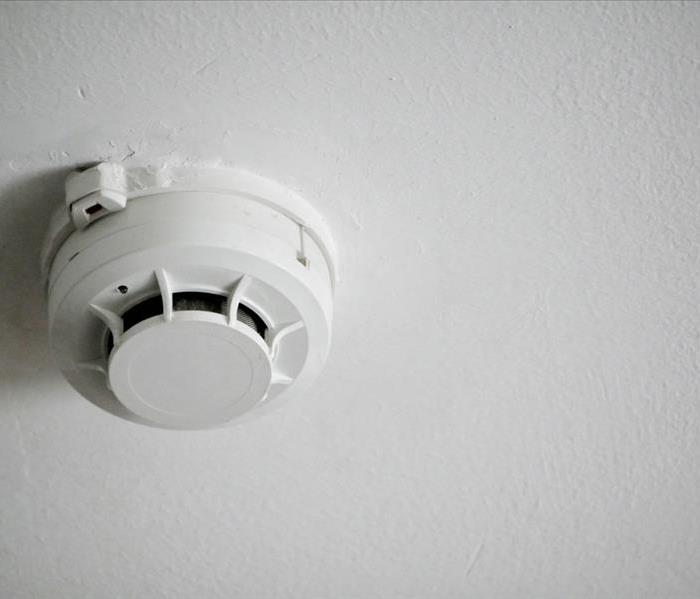 Install a smoke detector
Install a smoke detector
Tips To Keep Your Kitchen Safe From A Fire
You want to keep your kitchen fire-free. This prevents fire damage to your home in Cumming, GA, and keeps you from having to hire a qualified restoration professional. Fortunately, you can follow a few tips to keep your kitchen safe from a fire.
1. Keep Appliances Serviced
One of the best tips you can follow is to ensure your appliances are working and clean. Clean the crumbs out of your toaster oven. Wash the inside of your microwave. Clean your oven. Have any malfunctioning appliances replaced or repaired immediately.
2. Unplug Small Appliances
Another of the top tips you need to follow is to unplug your small appliances when you are not using them. Things like toaster ovens, coffee pots, and mixers can only draw electricity if they are plugged in. Unplugging them prevent these appliances from drawing too much power when they are not on and straining any old wiring.
3. Install a Smoke Detector
Be sure to have smoke detectors in your home. Be sure to place it in a neighboring room that will allow it to detect any kitchen fires, but not let steam set off the alarm.
4. Use Caution With a Gas Stove
Always be careful when lighting your gas stove. Make sure to follow the instructions that came with it.
5. Don’t Put Metal in Your Microwave
Never put metal in your microwave. Microwaved metal will produce sparks that can start a fire in your kitchen.
6. Go Light on the Oil
When cooking with grease or any oil, don't put too much in your pots. This can splash and erupt into flames.
7. Wipe Up Spills
Never cook if you have spills on your stove. Built-up grease can easily catch on fire. Cleaning your stove can improve fire safety.
Due to faulty wiring or a simple grease fire, a kitchen fire is not something you want to experience. Following these simple instructions can help you reduce your chances of a fire.
What to Expect When You Call a Fire Mitigation Professional
11/11/2020 (Permalink)
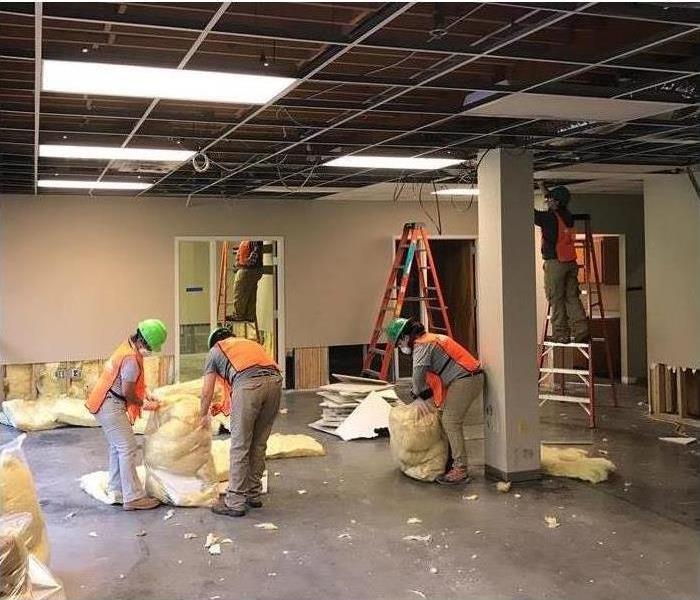 Commercial fire cleanup
Commercial fire cleanup
What to Expect When You Call a Fire Mitigation Professional
When your Jasper, GA, business has an incident resulting in fire damage, you may not know what to expect throughout the restoration process. If you choose to work with a mitigation team to bring your facility back to an operational state, look for the following four steps to take place.
1. Assessment of Damage
After the fire is put out, and you are left with the bones of what was once a functional business place, a fire mitigation crew can come to your facility and access the situation. These professionals will determine the severity of damage and what work is needed for a full restoration. You may wish to have an insurance adjuster on-site to evaluate the costs involved in the clean-up and rebuilding process.
2. Preventative Measures
After the extent of the fire damage has been determined, a mitigation team will determine is safety and damage prevention is needed on the site. Following a fire, the building's integrity may be compromised. Preventing further damage might require some of the following measures from your mitigation expert:
- Boards over broken windows
- Placing tarps over fire-damaged roofing
- Boarding up damaged walls to prevent water damage
3. Restoration Preparation
Once relative safety is in order, it will be time for preparing the space for restoration. Before restoration can take place, removal of contaminants is essential. Special equipment used by the commercial restoration company will ensure water, smoke, soot and odors are eliminated before new materials are installed.
4. Commercial Restoration
Once you make it through the accessing, preventative and preparatory phases, it will be time to restore your facility to a fully safe and functional state. The restoration process can involve many steps and may require a large crew depending on the degree of fire damage that occurred at your commercial facility. New drywall, paint or flooring are common repairs after a fire. For more serious restoration, a construction team may need to rebuild entirely to fully bring back your commercial space.
Contact a local mitigation team to start the path towards restoring your Jasper, GA, business. Watch for these basic steps to occur as you get your facility back to where it was before.
4 Important Tips To Prevent Kitchen Fires
9/18/2020 (Permalink)
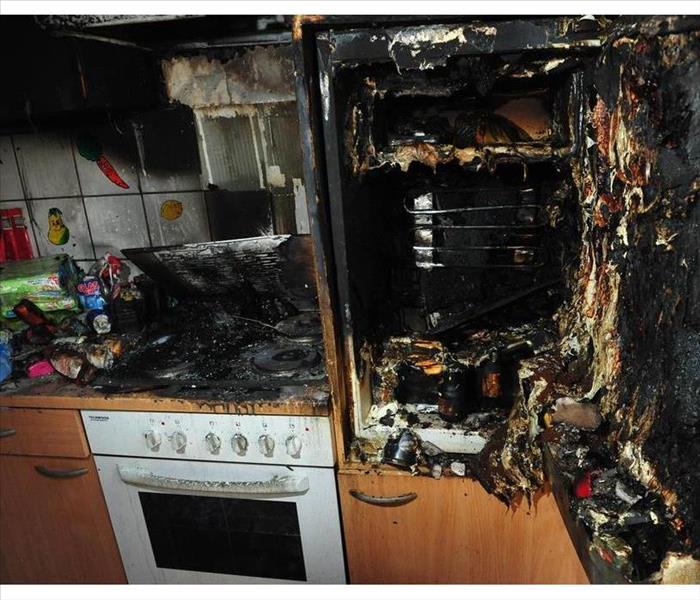 Kitchen fire damage in Holcombe, GA
Kitchen fire damage in Holcombe, GA
Tips To Avoid a Kitchen Fire
If you live in Holcombe, GA, you probably spend a lot of time in your home’s kitchen — which is also the room where most home fires start. Here are a few simple safety tips to help you avoid a kitchen fire.
1. Don't Forget About Your Food
Stay in the kitchen when you're using the stove, and watch out for warning signs, such as a smoking pan or boiling-over pot. Always set a timer, even for short cooking times. When you're finished cooking, be sure to turn off the burners or oven.
2. Keep Your Cooking Space Clean and Clear
Spills and grease spatters can ignite quickly, so be sure to wipe down your stove and clean your oven regularly. Keep the area around the stove clear of flammable items, like potholders, paper towels or cookbooks. Fire can quickly spread to these objects; in fact, fire restoration experts say this is one of the most common ways that grease fires spread to the rest of the kitchen and beyond.
3. Don’t Put Metal in the Microwave
This is one of the best-known fire prevention tips, but microwave fires remain extremely common. Utensils or aluminum foil are obvious sources of metal, but metal can also be present in other places, such twist-ties, takeout container handles, or the remnants of foil seals. Carefully check everything you put in the microwave to ensure it is microwave-safe.
4. Be Prepared To Smother Flames Quickly
A fire extinguisher is your best bet to stop a fire, so keep one in your kitchen or nearby. If you don’t have an extinguisher, throw baking soda onto the fire. Never put water on a grease fire! If the flames are in a pan, cover the pan with a lid (or a large cookie sheet). If the fire is in the oven, close the oven door and turn off the oven.
While you can’t eliminate every fire hazard from your kitchen, following these tips will go a long way toward keeping you and your home safe from fire damage.
How To Remove Smoke Odor Damage
7/9/2020 (Permalink)
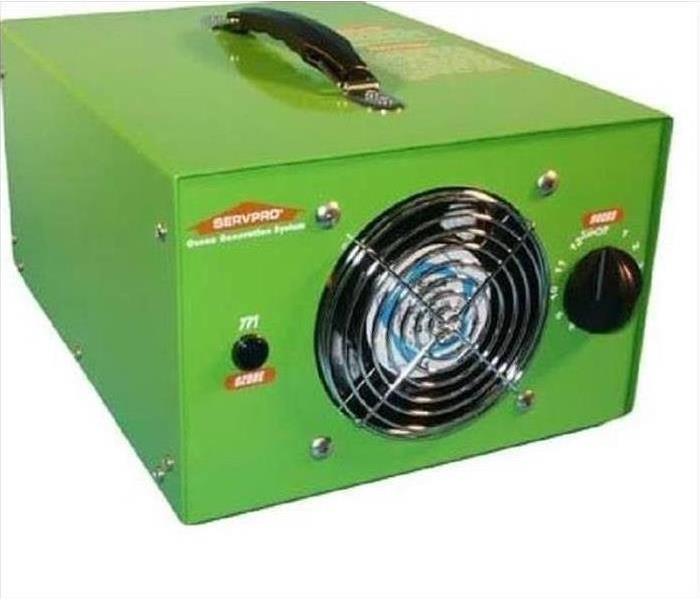 Ozone generators work by breaking oxygen molecules apart
Ozone generators work by breaking oxygen molecules apart
Methods To Remove Smoke Odor
If you have experienced a fire in, Jasper, GA, you may need to perform smoke cleaning to finish the restoration process. Fires can leave many types of damage in their wake. Once the structural damage is fixed, you may find that your building smells like smoke. Nasty odors can hide in carpets, walls, or other porous surfaces. Luckily, there are several effective methods that are commonly used to remove smoke odors.
1. Air Filtration Devices
Air scrubbers and air purifiers are both used as air filtration devices. Air scrubbers are the more powerful version and are used when there are a large number of pollutants. These devices work by sucking the air in and running it through a filter that traps small particulates and then releases the clean air back into the room. When using HEPA filters in the machines, 99.97% of particles are removed from the air.
2. Ozone Machines
Ozone generators work by breaking oxygen molecules apart. The single oxygen molecules bond with other oxygen molecules to create ozone molecules. The ozone molecules break down harmful VOCs, protein smoke, and other chemicals often caused by smoke damage. Ozone generators must be set and then left to run while no one is in the building. Once the machine has finished its smoke cleaning job, it will be safe to enter.
3. Thermal Foggers
When using a fogging machine, everyone must wear protective clothing while operating the machines. Thermal foggers use a petroleum-based deodorizer to neutralize smoke odor. The fog then permeates the area, while filling rooms and tiny cracks and crevices. Once fog dissipates, the odors should be gone.
To get rid of odors for good, use a professional restoration service that specializes in smoke cleaning. This is often the last step in restoring your property after a devastating fire and will leave your building "Like it never even happened."
 No matter how serious your property damage may be, SERVPRO of Forsyth & Dawson is your local expert for restoring your home or business.
No matter how serious your property damage may be, SERVPRO of Forsyth & Dawson is your local expert for restoring your home or business.





 24/7 Emergency Service
24/7 Emergency Service










